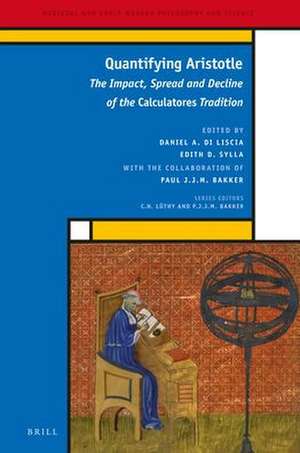Quantifying Aristotle: The Impact, Spread and Decline of the <i>Calculatores</i> Tradition: Medieval and Early Modern Philosophy and Science, cartea 34
Daniel A. Di Liscia, Edith D. Syllaen Limba Engleză Hardback – iun 2022
Din seria Medieval and Early Modern Philosophy and Science
- 5%
 Preț: 1424.85 lei
Preț: 1424.85 lei - 18%
 Preț: 1026.13 lei
Preț: 1026.13 lei - 18%
 Preț: 667.77 lei
Preț: 667.77 lei - 18%
 Preț: 550.18 lei
Preț: 550.18 lei - 18%
 Preț: 682.61 lei
Preț: 682.61 lei - 18%
 Preț: 892.77 lei
Preț: 892.77 lei - 18%
 Preț: 897.36 lei
Preț: 897.36 lei - 18%
 Preț: 660.82 lei
Preț: 660.82 lei - 18%
 Preț: 870.98 lei
Preț: 870.98 lei - 18%
 Preț: 636.55 lei
Preț: 636.55 lei - 18%
 Preț: 633.06 lei
Preț: 633.06 lei - 18%
 Preț: 664.40 lei
Preț: 664.40 lei - 18%
 Preț: 678.68 lei
Preț: 678.68 lei - 18%
 Preț: 869.83 lei
Preț: 869.83 lei - 18%
 Preț: 584.93 lei
Preț: 584.93 lei - 18%
 Preț: 765.49 lei
Preț: 765.49 lei - 18%
 Preț: 852.67 lei
Preț: 852.67 lei - 18%
 Preț: 795.00 lei
Preț: 795.00 lei - 18%
 Preț: 671.40 lei
Preț: 671.40 lei - 18%
 Preț: 600.75 lei
Preț: 600.75 lei - 18%
 Preț: 838.40 lei
Preț: 838.40 lei - 18%
 Preț: 752.05 lei
Preț: 752.05 lei - 18%
 Preț: 632.02 lei
Preț: 632.02 lei - 18%
 Preț: 656.43 lei
Preț: 656.43 lei - 18%
 Preț: 679.75 lei
Preț: 679.75 lei - 18%
 Preț: 683.66 lei
Preț: 683.66 lei - 18%
 Preț: 900.54 lei
Preț: 900.54 lei - 18%
 Preț: 719.00 lei
Preț: 719.00 lei - 18%
 Preț: 723.43 lei
Preț: 723.43 lei - 18%
 Preț: 716.19 lei
Preț: 716.19 lei
Preț: 804.36 lei
Preț vechi: 980.93 lei
-18% Nou
Puncte Express: 1207
Preț estimativ în valută:
153.92€ • 164.59$ • 128.33£
153.92€ • 164.59$ • 128.33£
Carte indisponibilă temporar
Doresc să fiu notificat când acest titlu va fi disponibil:
Se trimite...
Preluare comenzi: 021 569.72.76
Specificații
ISBN-13: 9789004499829
ISBN-10: 9004499822
Dimensiuni: 155 x 235 mm
Greutate: 0.82 kg
Editura: Brill
Colecția Brill
Seria Medieval and Early Modern Philosophy and Science
ISBN-10: 9004499822
Dimensiuni: 155 x 235 mm
Greutate: 0.82 kg
Editura: Brill
Colecția Brill
Seria Medieval and Early Modern Philosophy and Science
Notă biografică
Daniel A. Di Liscia (Ph.D. 2003), is Lecturer at the Ludwig-Maximilians-Universität München (Germany), at the Munich Center for Mathematical Philosophy. He worked on the edition of Copernicus and Kepler, and published several papers on the Oxford Calculators, in particular on the latitude of forms.
Edith D. Sylla (Ph.D. 1971) is Professor Emerita at North Carolina State University (Raleigh, North Carolina). She works on the history of mathematics, physics, and their interrelations from the late Middle Ages to the early eighteenth century.
Edith D. Sylla (Ph.D. 1971) is Professor Emerita at North Carolina State University (Raleigh, North Carolina). She works on the history of mathematics, physics, and their interrelations from the late Middle Ages to the early eighteenth century.
Cuprins
Acknowledgements
List of Figures
Notes on Contributors
Introduction
Daniel A. Di Liscia
1 Thomas Wylton on the Ceasing of an Instant of Time
Cecilia Trifogli
2 The New Interpretation of Aristotle: Richard Kilvington, Thomas Bradwardine, and the New Rule of Motion
Elżbieta Jung
3 The Opuscula de motu Ascribed to Richard Swineshead: The Testimony of the Ongoing Development of the Oxford Calculators’ Science of Motion
Robert Podkoński
4 Calculations in Thomas Bradwardine’s De causa dei, Book I
Edit Anna Lukács
5 The Calculators on the Insolubles: Bradwardine, Kilvington, Heytesbury, Swyneshed, and Dumbleton
Stephen Read
6 The Influence of the Oxford Calculatores on the Understanding of Local Motion: The Example of the Tractatus de sex inconvenientibus
Sabine Rommevaux-Tani
7 Wyclif, the Black Sheep of the Oxford Calculators
Mark Thakkar
8 On the Reception of English Logic at Universities of Central Europe: Helmoldus de Zoltwedel (Prague, Leipzig) on the Liar-Paradox
Harald Berger
9 Blasius of Parma on the Calculation of the Variation of Qualities and Aristotelian Physics
Joël Biard
10 The Calculators Tradition in Oresme’s De visione stellarum
Aníbal Szapiro
11 Perfections and Latitudes: The Development of the Calculators’ Tradition and the Geometrisation of Metaphysics and Theology
Daniel A. Di Liscia
12 Decline of the Calculators in Paris c. 1500: Humanism and Print
Richard Oosterhoff
13 Some Aspects of the ‘Rules’ of motus difformis in Angelo da Fossambruno’s Commentary on Heytesbury’s De tribus praedicamentis
Fabio Seller
14 Leibniz and the Calculators
Edith Dudley Sylla
Manuscripts
Bibliography
Index Nominum
List of Figures
Notes on Contributors
Introduction
Daniel A. Di Liscia
1 Thomas Wylton on the Ceasing of an Instant of Time
Cecilia Trifogli
2 The New Interpretation of Aristotle: Richard Kilvington, Thomas Bradwardine, and the New Rule of Motion
Elżbieta Jung
3 The Opuscula de motu Ascribed to Richard Swineshead: The Testimony of the Ongoing Development of the Oxford Calculators’ Science of Motion
Robert Podkoński
4 Calculations in Thomas Bradwardine’s De causa dei, Book I
Edit Anna Lukács
5 The Calculators on the Insolubles: Bradwardine, Kilvington, Heytesbury, Swyneshed, and Dumbleton
Stephen Read
6 The Influence of the Oxford Calculatores on the Understanding of Local Motion: The Example of the Tractatus de sex inconvenientibus
Sabine Rommevaux-Tani
7 Wyclif, the Black Sheep of the Oxford Calculators
Mark Thakkar
8 On the Reception of English Logic at Universities of Central Europe: Helmoldus de Zoltwedel (Prague, Leipzig) on the Liar-Paradox
Harald Berger
9 Blasius of Parma on the Calculation of the Variation of Qualities and Aristotelian Physics
Joël Biard
10 The Calculators Tradition in Oresme’s De visione stellarum
Aníbal Szapiro
11 Perfections and Latitudes: The Development of the Calculators’ Tradition and the Geometrisation of Metaphysics and Theology
Daniel A. Di Liscia
12 Decline of the Calculators in Paris c. 1500: Humanism and Print
Richard Oosterhoff
13 Some Aspects of the ‘Rules’ of motus difformis in Angelo da Fossambruno’s Commentary on Heytesbury’s De tribus praedicamentis
Fabio Seller
14 Leibniz and the Calculators
Edith Dudley Sylla
Manuscripts
Bibliography
Index Nominum
